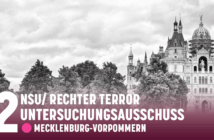For over a decade between 1999 and 2011 a cell of the far-right ‘National Socialist Underground’ group (NSU) committed at least ten murders and three nail bombings, mostly targeting Turkish migrants. Two of the cell died in the aftermath of a bungled bank robbery, a third alleged member of the cell who then turned herself in to the police in November 2011, is standing trial along with four other alleged accomplices on lesser charges. CAJ recently attended the trial in Munich as international observers at the invitation of representatives of victims and activists working on the cases. CAJ’s Deputy Director, Daniel Holder, also gave a public lecture in Berlin in relation to addressing the questions of collusion and ethnic bias in the criminal justice system, reflecting on our experiences of the local conflict.
published in Just News by the Committee on the Administration of Justice Ltd.
The NSU cases have commanded considerable attention in Germany and Turkey. A particular area of controversy has been the relationship between the NSU and the German security services running of informants within such groups. The Federal Office for the Protection of the Constitution – the BfV, had infiltrated the NSU with informants, yet its murders continued unabated until the events of 2011. However the BfV took the decision to shred files relating to their NSU informant operations, at the same time in November 2011 as the alleged third member of the NSU cell had handed herself into police. According to one informant the BfV (who rather than the police have primacy for running informants in far-right groups) was encouraged whilst in prison for far right offences, to remain active on the neo-Nazi scene. He published numerous editions of a far right pamphlet which was funded by the handsome payments he received from his handlers. Other human rights issues in relation to the NSU cases included charges of institutional racism against investigative authorities, whom it is alleged showed little interest in following obvious leads to murders being far right killings, but rather had a tendency to erroneously suspect the migrant victims whom may have been involved in organised crime or drugs trafficking.
A German parliamentary inquiry interviewed over 100 witnesses consulted 12,000 files and filed a 1,300 page report. It recommended more diversity within the police and security services and intercultural training. The Inquiry did not fully clarify the issues around the BfV and the role of informants in the NSU, nor made findings of structural or institutional racism. In response a report by the Turkish Community in Germany went much further recommending the disbandment of the BfV, a ban on racial profiling by law enforcement agencies, and the elimination of the ‘large network of informants’ within the far right scene. A critical debate has also ensued in the media, including mainstream media, as to whether the systems of informants should be abolished. Yet much media discussion has also focused on explanations of ‘mistakes’ by the police and security services rather than structural and systemic problems.
The ongoing NSU trial in Munich is one of the biggest Germany has seen in recent years. Testimony is planned from over 600 witnesses in proceedings which began in May 2013. The criminal process in Germany is inquisitorial, with judges leading the questioning, other parties can file motions to call witnesses, but the court will take the decision as to whether they are to be heard. No official record is taken of the proceedings, even the judges have to take their own notes. The trial is held in a vast court room with a packed upper gallery for the public and press. There are five presiding judges, and two alternates; the five defendants and their legal teams, a bank of representatives of the prosecution service, dozens of victims families and their legal representatives are also represented. Yet there is little indication to date that the trial will be able to provide examination and accountability for state wrongdoing. Investigators will clearly not have access to relevant security service files, as they have been shredded.
The NSU cases touch on numerous human rights themes familiar to Northern Ireland, as well as cases such as that of Steven Lawrence. There are questions about sectarian or racial bias within law enforcement agencies, questions about the role of the security services, and questions about the role of informants. In raising the question of collusion it would be difficult to identify the same type of clear political objective for policies and practices as our own experiences testify to. Yet there are numerous similar questions over the permitted conduct of agents of the state in actions from propaganda to violence which constitute human rights violations, agencies valuing maintaining their informant over and above enforcing the law, and the tendency to cover up wrongdoing rather than conceding accountability. Such matters are clearly ones which stretch well beyond our or Germany’s borders, yet for all the current focus on other aspects of covert policing, particularly surveillance, there is little in Council of Europe or UN human rights standards that specifically address the permitted conduct and handling of informants. CAJ will continue to develop a body of work in this area.


